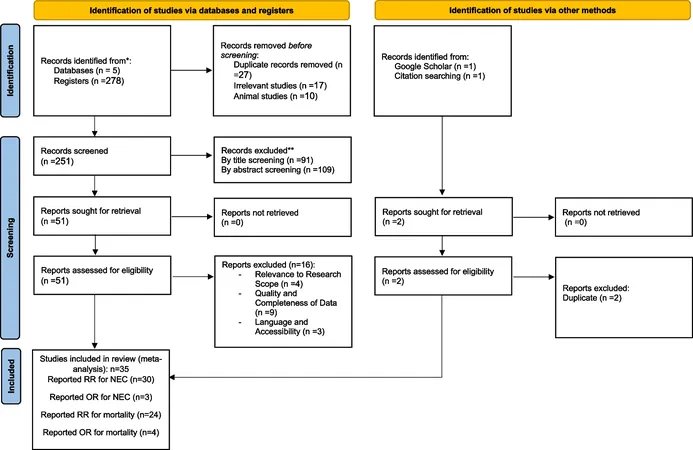
Unlocking the Power of Probiotics: A Game-Changer in the Fight Against Necrotizing Enterocolitis in Premature Infants!
2025-04-11
Author: Ming
A Serious Threat: Understanding Necrotizing Enterocolitis (NEC) in Premature Infants
Necrotizing Enterocolitis (NEC) is a complex and dangerous condition that poses significant risks to premature infants, leading to high rates of death and serious long-term health issues. Currently, the incidence of NEC in neonates varies widely across healthcare facilities, showing alarming rates from 2% to 13% among preterm infants, especially those with very low birth weights.
What Causes NEC?
Several factors contribute to the development of NEC, including: - Premature birth and low birth weight - Premature rupture of membranes - Assisted ventilation and sepsis - Formula feeding and prolonged antibiotic use Symptoms can range from vague signs like apnea and abdominal distension to life-threatening complications such as intestinal perforation.
Traditional Treatments and Their Shortcomings
Current treatment options primarily include bowel rest, parenteral nutrition, and, in severe cases, surgical intervention. However, these strategies come with drawbacks, like extended hospital stays and significant healthcare expenses, highlighting a desperate need for more effective and less invasive solutions.
Probiotics: A Promising Preventative Strategy?
Probiotic supplementation has emerged as a beacon of hope in preventing NEC. Studies have hinted that these beneficial microorganisms can significantly lower the chances of NEC and related mortality. Despite encouraging results from some meta-analyses, inconsistencies still exist, sparking a quest for further clarity.
The Role of Probiotics and How They Work
Commonly found in neonatal intensive care units, probiotics like Bifidobacterium, Lactobacillus, and Saccharomyces resist harmful digestive conditions and support gut health in preterm infants. They promote a balanced microbiota by competing for nutrients and harmonizing immune responses, potentially offering protection against NEC.
The Umbrella Meta-Analysis: Insights and Results
To address the previous inconsistencies, an extensive umbrella meta-analysis was executed, combing through a vast range of both randomized and controlled studies. Initial findings reveal that probiotics significantly reduce NEC incidence and related mortality, especially in preterm infants with gestational ages between 32-37 weeks.
Key Findings You Can’t Overlook
- Probiotic supplementation led to a notable reduction in NEC rates (Risk Ratio: 0.51, p < 0.001). - Additionally, it drastically lowered mortality rates among those affected by NEC (Risk Ratio: 0.72, p < 0.001). - Multi-strain probiotics demonstrated particularly robust effects compared to single-strain supplements.
The Need for Standardized Probiotic Protocols
Despite these promising results, there's a pressing need for standardized recommendations regarding probiotic strains and dosages. Variabilities in clinical practices have generated wide disparities in probiotic effectiveness, emphasizing the requirement for future studies to create consensus guidelines.
Looking Ahead: Prioritizing Future Research
The insights from this meta-analysis underscore the urgent need for longitudinal studies to explore the long-term safety and efficacy of probiotics in vulnerable populations. Additionally, investigating the precise interactions of probiotics within the gut microbiota will further strengthen their role in neonatal care.
Conclusion: A Bright Future for Premature Infants?
In conclusion, while probiotics hold tremendous potential in reducing the burdens of NEC, meticulous research and clinical trials are essential to fully harness their benefits. By prioritizing standardization and comprehensive understanding, we can pave the way for groundbreaking improvements in the health and survival of premature infants.




 Brasil (PT)
Brasil (PT)
 Canada (EN)
Canada (EN)
 Chile (ES)
Chile (ES)
 Česko (CS)
Česko (CS)
 대한민국 (KO)
대한민국 (KO)
 España (ES)
España (ES)
 France (FR)
France (FR)
 Hong Kong (EN)
Hong Kong (EN)
 Italia (IT)
Italia (IT)
 日本 (JA)
日本 (JA)
 Magyarország (HU)
Magyarország (HU)
 Norge (NO)
Norge (NO)
 Polska (PL)
Polska (PL)
 Schweiz (DE)
Schweiz (DE)
 Singapore (EN)
Singapore (EN)
 Sverige (SV)
Sverige (SV)
 Suomi (FI)
Suomi (FI)
 Türkiye (TR)
Türkiye (TR)
 الإمارات العربية المتحدة (AR)
الإمارات العربية المتحدة (AR)